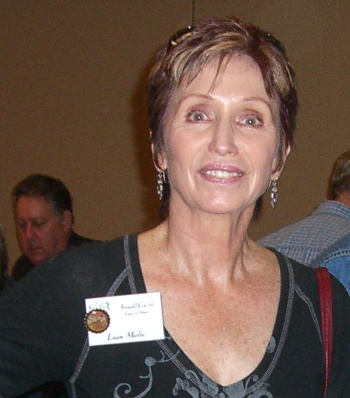Louise Marley will be a Guest of Honor at this year's ArmadilloCon, so I made an effort to read one of her books. I like to have an idea what the Guest of Honor is "about". "Glass Harmonica" was a fun book to read.
The most straightforward plot I've seen in years
It's set in the near future about a decade from now. The protagonist is a young woman named Erin, a world-renowned musician who plays glass harmonica, the title instrument of the book. It's a device that's played by running one's fingers over the rims of spinning glasses. Her twin brother, Charlie, is a composer who suffers from a neurodegenerative illness that made him incapable of walking. He undergoes an experimental treatment that supposedly has a chance to help him walk again.
Then there is a parallel story line set in the late 1700s in England, where the protagonist is a teenage girl Eilish, a street musician who, too, plays a glass harmonica. She's been lifted out of poverty by Benjamin Franklin when Franklin constructed a glass harmonica, and needed a talented musician to play it and help him improve its design. He was impressed by Eilish's talent and employed her in that capacity.
And that's about it. This pretty much describes the plot of the book. It is very straightforward. There are no twists or surprises. Not any major ones, anyway. It's so devoid of mystery or suspense, that you start to wonder, will anything notable, shocking, or simply unexpected, ever happen in the book? Even as things get worse for some characters, they do so in a very gradual, predictable manner.
Science and pseudoscience
I'm actually not sure I would call this book science fiction. Maybe science fantasy. Actually, Louise Marley once said her favorite genre is science fantasy. There are two kinds of science-fictional elements in this novel:
(1) the two girls occasionally see one another as a ghost-like presence;
(2) Charlie's experimental treatment consists of stimulating his brain by certain sounds, to help route neural impulses to his legs around the damaged neuron pathways.
(1) The ghosts are "explained" by "quantum weirdness". As soon the word "quantum" is uttered, the characters throw up their hands and admit they don't know first thing about it, yet they believe they found a good explanation. Because hey, everybody knows quantum physics is "weird", so who's to say it can't explain ghosts? As well as a whole slew of paranormal phenomena, such as remote viewing? Maybe I'm being unjustly sarcastic here, as well as oversimplifying a little, but pseudoscience irks me. Anyone who actually understands quantum physics (not that I do) will tell you that quantum physics can't explain paranormal phenomena... if they really exist. And I don't believe they do. I wouldn't be involved in the Center For Inquiry otherwise.
I find (2) a lot more credible than (1). Some research into rerouting neural impulses in the brain is already taking place. There's been some fascinating research that suggested it may be possible for blind people to "see" with their tongues (video signals from a camera are routed to a sensor placed on a person's tongue, which translates them into electrical impulses that "tingle" the tongue in certain patterns. The patterns the tongue senses are interpreted by the brain as images). Similarly, people suffering from chronic vertigo can use a tongue sensor to teach the brain to compensate for confusing signals from inner ear (that are causing the vertigo). In light of this, reprogramming your brain with sound doesn't seem too infeasible, but I still have strong doubts. Since it's a relatively low-tech concept, it would seem somebody would have tried it already. Perhaps someone had. But we haven't heard of any discoveries in that area.
A perfect escapist book
However, if you don't ask too many questions, this book can be quite enjoyable. It's a fast, lighthearted read. So fast it practically read itself! Such a contrast to several "high concept" SF books I've read lately that were loaded with plot speed bumps. The story in this book flows smoothly like a melody from a musician's fingertips (not that I ever heard glass harmonica music, so perhaps my metaphor isn't appropriate.
The main characters are all likeable, and it's fun to get glimpses into a rarefied world of classical musicians, their jet-setting lifestyle of concerts, press interviews, and spur-of-the-moment jaunts to London. And romance is handled very well in this book! It's not something I see often in SF. In most books I read (perhaps because they are written by male writers) the romance storyline consists of two scenes: first, the heroine and the hero find each other attractive, second, they fall into bed. That's it. How boring. Where's the suspense, the mystery, the pining, the uncertainty? Not so in "Glass Harmonica". There's plenty of suspense here: will the two would-be lovers get together or not? There's plenty of pining, and shyness, and teasing, and pulling back at the last minute. Very well done! It is, in a word, a perfect escapist book.





1 comment:
I read this book and I love it. I am a street performer myself, and I also play glasses (but not on the street... on the street I play the musical saw). I found Marley's descriptions of the glass music as well as street muscian's scenes very accurate and authentic.
A truely wonderful book which I'm sure I'll be reading again.
All the best,
'Saw Lady'
http://www.SawLady.com/blog
Post a Comment